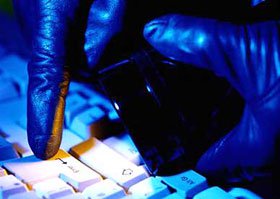10 tips to help you avoid hacker trap
Using computers is familiar in a modern and vibrant city like Hongkong. This is evidenced by the data that the Statistics Office of Hong Kong recently announced as 76% of households with computers and 73.3% of those computers connected to the Internet.
Almost absolute (98.8%) business activities use email as the most popular means of exchange.
It can be said that the Hong Kong people are attached to the computer every day, from monitoring the stock market, discussing with partners to work with colleagues at work. Therefore, it is not surprising that in 2009, the number of Internet-related crimes increased dramatically.

Besides the main culprit is hackers, a cause of many cases is that victims lack serious warnings, there are no adequate security measures for important personal information.
Just a click away on phishing sites, you can submit to the hacker what they need as an email password or worse, sensitive information such as bank account numbers, credit cards .
These fraudulent activities are becoming more and more sophisticated. If classic trick emails like ' Congratulations, you win the jackpot ' or a million dollar inheritance from . heavenly falls today are no longer easy to deceive, the fake sites are still easy to bypass. many users.
Last year, Hong Kong police had several times to warn about fake websites that had the same interface as the websites of big banks. Declaring information on it means you have caught a trap.
The expansion of social networks like Facebook or direct messaging has created a fertile ground for cybercriminals to grow, putting Internet users at risk at any time.
Hong Kong's security and technology circles offer 10 tips for you to be safer with the Internet:
1. Install a strong firewall on your computer.
2. Carefully review the URLs before clicking on a link.
3. Never reply to ' spam '.
4. Never open email attachments unless you know the source.
5. For Windows users, it is necessary to activate Windows Update to be updated regularly.
6. Don't reply to ' chain ' emails.
7. Continuously change the password.
8. Set difficult-to-guess passwords like a combination of letters and numbers.
9. Avoid opening, accessing sensitive personal information or financial information (bank accounts, credit cards .) outside the coffee cafe.
10. Always exit emails and social networks after using.
You should read it
- Beware of the 7 most common types of spam
- What is email encryption? Why does it play an important role in email security?
- What is cybercrime? How to prevent cybercrime?
- Virtual social network - new hacker 'gold mine'
- Be careful of the 'trap' spams during the Christmas season
- What is spam? How is it understood in Zalo, LoL, Facebook ...
- Tips that make it hard for others to find you on Facebook
- Facebook virus appears
- How to handle when email automatically sends bulk spam
- Vietnamnet network crashes: What is anticipated
- The Forum focuses on notorious social network hackers who have been hacked and sold for sale on other forums
- The cybersecurity tools that every business should know
Maybe you are interested
This AI system can better control ship collision at sea than humans Hacker attacks a US city demanding $ 100,000 ransom with Bitcoin Satellite creates a detailed picture of maritime operations What color is the turn signal light? It's easy to think but 90% of people answer wrong Close up of the scene of the horrifying explosion of the super volcano, engulfing the whole city Listed 10 most picturesque but dangerous waterways in the world
